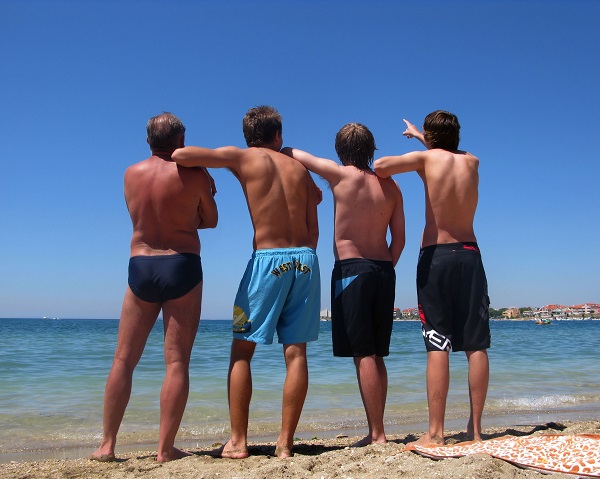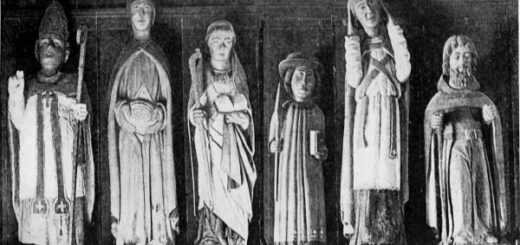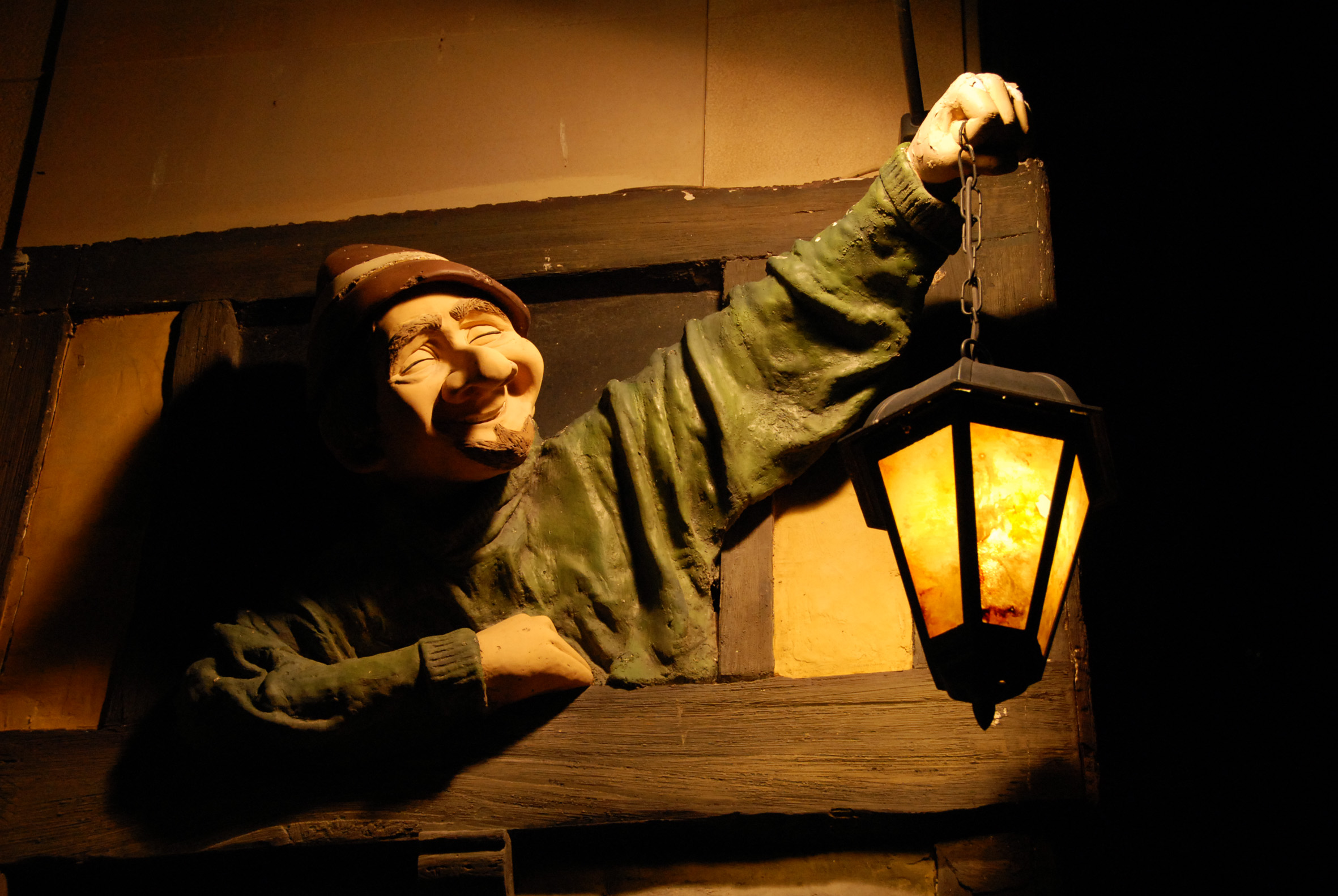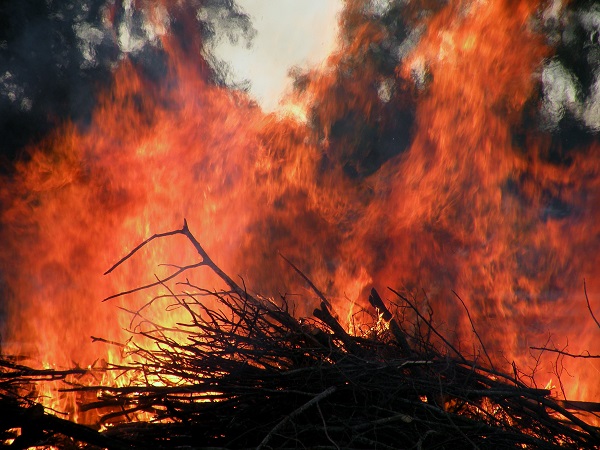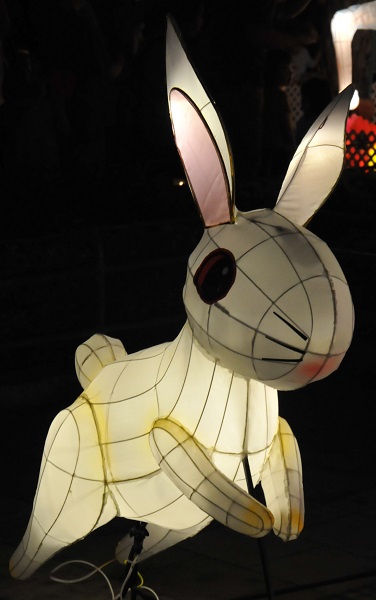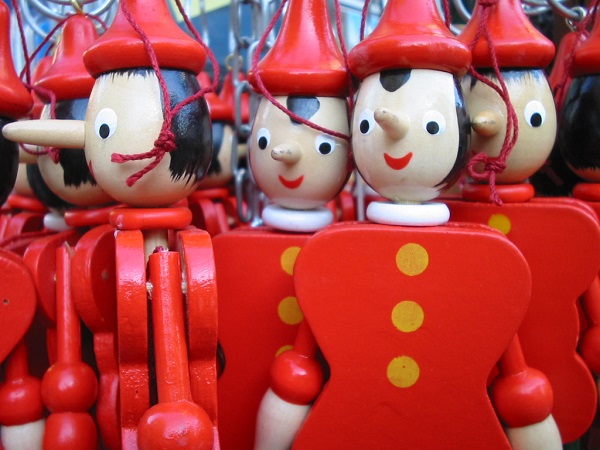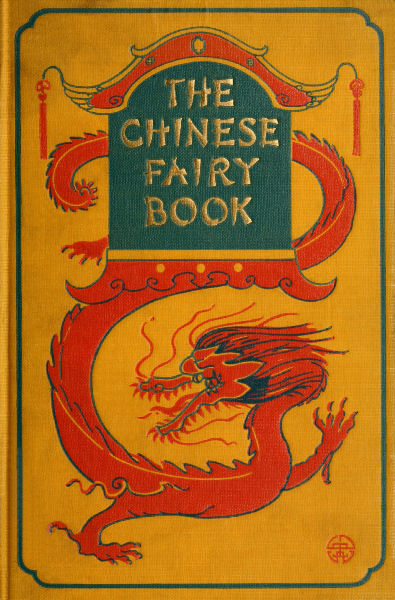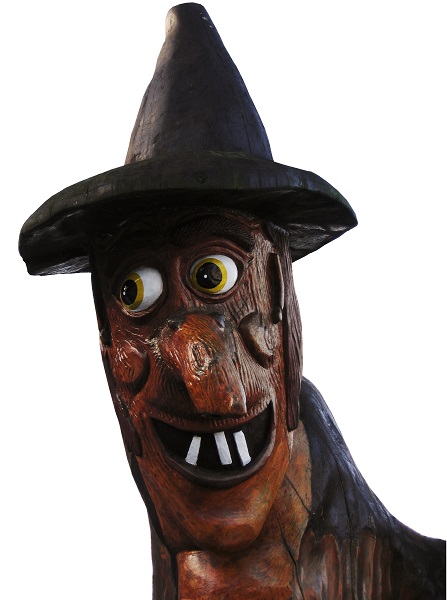Here are Ladies (STORIES OF THE FOREIGN LEGION, 1947) by P. C. WREN

A sluggish, oily river with mangrove-swamp banks; a terrible September day with an atmosphere of superheated, poisonous steam; and the two French gunboats, Corail and Opale, carrying a detachment of the French Foreign Legion, part of an expeditionary force entrusted with the task of teaching manners, and an enhanced respect for Madame la République, to Behanzin, King of Dahomey.
The Legionaries standing, squatting, and lying on the painfully hot iron decks, were drenched in perspiration. The light flannel active-service kits, served out to them at Porto Novo, clung wetly to their bodies. From under the big ugly pith helmets of dirty white, dirty white faces showed cadaverous and wan. For a month they had forced their way through the West African jungle, sometimes achieving as much as a mile an hour through the sucking mud of a swamp; sometimes thrusting their stifling, choking way through elephant grass eight to ten feet in height; and again fighting through dense tangled bush with chopper, coupe-coupe, and axe. They had travelled “light,” with only rifle and bayonet and one hundred and fifty rounds of ammunition, but even this lightness had been too heavy for some. The more coffee and quinine for the rest! To give variety to the sufferings of fatigue, fever, hunger, thirst, and dysentery, the Dahomeyans frequently attacked in the numerical superiority of a hundred to one. No mean opponents either, with their up-to-date American rifles and batteries of Krupp guns for long range work, and their spears and machetes for the charge.
As usual, the Legion was marking its trail with the generous distribution of the graves of its sons.
And now the VIIth Company had left swamp and jungle for the floating ovens Corail and Opale. Terrific heat, but no sunshine; the “landscape” minatory, terrible; life, the acme and essence of discomfort and misery. Even the Senegalese boatmen seemed affected and depressed.
“Say, John! Is this-yer penny-steamboat trip fer the saloobrity of our healths?” asked the Bucking Bronco, in a husky voice, of his neighbour le Legionnaire Jean Boule or John Bull. The old soldier wiped the sweat from his face with his sleeve.
“I overheard Commandant Faraux telling Colonel Dodds that there is a ford up here somewhere, and that it must be found and seized,” he answered wearily. “I expect we’re looking for it now.”
“Well, I ain’t got it. Search me!” said the American. “I allow Ole Man Farrow’s got another think comin’ if he . . .”–a ragged crash of musketry from the bank a hundred yards distant, and the ironwork of the Opale rang again under a hail of bullets.
In ten seconds the Legionaries were lining the sandbagged bulwarks with loaded rifles at the “ready.”
“Oh, the fools–the silly bunch o’ boobs!” murmured the Bucking Bronco. “I allow thet’s torn it! The pie-faced pikers hev sure wafted the bloom off the little secret.”
“Yes,” agreed John Bull, “you’d have thought even Behanzin’s generals would have had the sense to lie low and not announce themselves until we’d got our column fairly tied up in the middle of the ford.” . . .
The roar of Hotchkiss guns and Lebel rifles from the two boats drowned his further remarks, as well as the irregular crashings of the bursts of Dahomeyan musketry. . . .
The debarkation of the VIIth Company was unhindered, the ford seized, and the safe passage of the Expeditionary Force guaranteed, the Dahomeyans having retired.
“Waal!” remarked the Bucking Bronco to his friend as half the VIIth Company moved off next morning, as Advance Guard. “Strike me peculiar ef thet ain’t the softest cinch I seen ever. Guess Ole Man Behanzin ain’t been to no West Point Academy. They say his best men is women–an’ I kin believe it!”
“Amazons,” remarked Jean Boule. “I pray we don’t come across any. Fancy shooting at women.”
“You smile your kind, fatherly smile at ’em, John, an’ I allow they’ll come an’ eat outer yer hand. . . . Are they really fightin’-gals, with roof-garden hats an’ shirt-waists, and mittens on their pasterns? . . . Gee-whiz! Guess I’ll take a few prisoners an’ walk with a proud tail!”
“They’re women, all right,” was the reply, “and I believe they are as dangerous as dervishes–apart from any question of one’s not shooting to kill when they charge. . . . If all I’ve heard about them is true, chivalry is apt to be a trifle costly.”
“Waal, John, as Légionnaires, we ain’t habituated to luxury any, and can’t afford naw then costly. Ef any black gal lays fer me with an axe–it’s a smackin’ fer hers.”
“Yes–but what are we going to do if an Amazon regiment opens an accurate and steady fire on us with Winchester repeaters and then charges with the bayonet?”
“Burn the trail for Dixie,” grinned the American. “I guess we’d hit the high places some, an’ roll our tails for Home. Gee-whillikins! Charged by gals!”
“That’s all very well,” grumbled the Englishman, “but the Legion doesn’t run, either from men or from women. If an Amazon regiment charges us, we’ve got to fight. . . . It would be ghastly.”
Even as he spoke the deadly silent forest suddenly gave birth to thousands of black shadows, all moving swiftly and noiselessly, and from all directions, upon the tiny column of the Advance Guard.
With one accord, at some signal, they halted, rested the butts of their rifles on their thighs, fired, and then, howling like devils, charged with great élan, led by a number of tall, muscular women, handsome and finely made.
“Gals!” gasped the American, as the column instinctively halted, faced outwards in two ranks, and poured magazine fire into the dense masses of the charging savages.
“Look at her!” he cried, and pointed to a young woman, who, bare to the waist, and wearing a fez cap, a short blue cotton kilt, and a leather belt and cartridge-cases, came bounding straight toward him. In her right hand she brandished a thick-backed, heavy chopping-sword like a coupe-coupe or machete, and in her left carried a bright new repeating-carbine. Nothing could have been more dashing, courageous, and inspiring than the leading of this Fury, as she rushed straight for the levelled rifles of the Legionaries, waving her men on and yelling mingled words of encouragement, threat, and taunt at them as she strove to bring them to the consummation of the charge.
Her efforts were in vain, however. The Dahomeyan male warrior is not of very heroic stuff, and does his best fighting in a surprised camp, a broken square, or against a scattered line. His métier is the ambush, the rush at dawn, the hacking and hewing hundred-to-one fight in dense jungle where the foe cannot form or charge, the tree-top sniping, the trampling flat of a worn-out enemy by sheer weight of numbers.
Before the steady fire of an unbroken line he generally wilts away, and vanishes shadow-like into the impenetrable depths of his native jungle, to try another surprise, another ambush, another dawn-rush of ten thousand men, at the next opportunity.
As usual, beneath the accurate fire that mowed them down in swathes, the Dahomeyans broke and fled, slowly followed by their Amazon leaders, who shrilly cursed, and fiercely struck at, the retiring faint-hearts.
Just as the “cease-fire” whistle blew, the woman who had been charging at the Bucking Bronco and John Bull (and who had stood screaming at her followers as they halted, faltered, and broke) threw up her arms and fell.
“That weren’t me,” quoth the Bucking Bronco, “an’ I hope it was a dod-gasted accident. She was some gal, that gal. Let’s have a look at her if we ain’t agoin’ to charge nor nawthen.”
The officer commanding the Advance Guard was certainly not going to charge. He was only too thankful to have beaten off the sudden and well-executed attack. How marvellously the brutes had materialized from the apparently uninhabited forest, still silent and gloomy as the tomb. But what fools! That force alone, properly handled, and attacking while the column was in the middle of the wide deep ford, might have told a very different story.
“Bugler,” called he, “blow the ‘alarm’ and the ‘regimental-call’ till your veins crack and your lungs burst. . . . No–turn toward the river, sot, I want the main body to hear. . . . Sergeant-Major, send two of the strongest running back with this.” . . .
They were the last words he spoke. The Amazons themselves were charging this time–a whole regiment–and no regiment in this world ever charged with greater dash, courage, violence, and determination. Firing as they came, and utterly disregarding the steady magazine-fire of the Legionaries, they swept down upon them like an avalanche–like cavalry–and burst upon the little line, through it, and over it, like a hailstorm across a wheatfield.
Rushing at Captain Roux, one fired her Spencer carbine into his chest, while another drove a spear into his abdomen. As he fell, a third stooped and deliberately hacked off his head with her chopping-knife. There was no question of “sparing women” as these furies, each as big and strong and well-armed as any Legionary, hacked, hewed, and thrust, or, kneeling a few yards from their victims, gave them the contents of the magazines of their carbines. . . .
While parrying the fierce thrusts of one stalwart virago, John Bull, struck on the head from behind by two assailants at once, fell to the ground, even as his eye had subconsciously taken in and registered upon his brain a picture of his mighty friend swinging his rifle round and round his head by the muzzle, the butt describing a circle within which he stood unhurt as to his body, though apparently shocked in mind, to judge from his roar of “Scat! ye shameless jumpin’ Jezebels!”
Without thought of defending himself, the bugler continuously blew the “alarm” and the “regimental call” (in the hope that it might carry back to the main body, which apparently had delayed longer at the ford than had been expected) until he went down with a bullet through his leg and another in his shoulder, two of seven fired at him from a score paces distance by a young Amazon. A minute later, the man rose to his knees and blew with almost undiminished strength, until the same young woman riddled his chest, at point-blank range, with another magazineful.
Recovering consciousness, John Bull saw a gigantic Amazon make a dive at the knees of the Bucking Bronco, ducking beneath the whirling rifle-butt. A moment later he was down, but, instead of being hacked to pieces, was borne away, kicking and cursing, by a dozen powerful women.
Knowing what that meant, he would rather have seen his friend killed before his eyes. . . . As another wave of faintness swept over him, he heard the distant strains of “Tiens! Voilà du boudin”–the March of the Legion, and knew that the buglers of the column were sending the encouraging notes ahead of their straining bodies, as the remainder of the force hurried to the rescue. Poor Bugler Langout’s message had carried on the heavy air, which seems to blanket the sound of rifle fire while transmitting that of a whistle, bugle, or war-drum to a surprising distance.
Heavy fire from the debouching troops saved the few survivors of the Advance Guard–but it was not until the whole column had fought a tough action in company squares, that the Amazons and the rallied and reinforced Dahomeyans acknowledged defeat, for that day at any rate, and disappeared shadow-like into the jungle as suddenly as they had come.
John Bull and the assistant-surgeon decided that the butt-end of a carbine had struck the former on the head, and that almost simultaneously a chopping-sword had struck the butt of the carbine while it was in contact with his skull, inasmuch as his head bore no cut, there were splinters of wood in his hair, and a carbine with a hacked stock lay beside him when he was picked up and examined. He had nearly been handed over to the burial-party instead of to the carriers, and, when he realized that the Bucking Bronco had been carried off, he almost wished that this had actually happened. Most horrible stories of the fate of prisoners of the Dahomeyans were current throughout the expeditionary force, though no proofs of their truth had yet materialized.
When a list of the killed, wounded, and missing was made out, it was found that the Sergeant-Major had disappeared also, and one of the survivors remembered seeing him borne off in a surging crowd of Amazons, “like a band of big black ants carrying off an injured wasp,” as he graphically described it.
That night John Bull, old Tant de Soif, the Grasshopper, Jan Minnaerts, Black Gaspard, Achille Martel, and one or two more of the escouadeto which the Bucking Bronco belonged, volunteered to go out as a scouring-party to reconnoitre for the enemy, and, incidentally, to try to discover some traces of their missing comrade and the sous-officier.
“Let Jean Boule be in charge,” said Lieutenant Roberte, commanding the remnants of the VIIth Company, vice Captain Roux, killed in action, “he has some sense, and can use the stars. If you fall into the hands of the enemy, I shall punish you severely–give you all a taste of the crapaudine perhaps. Bonne chance, mes enfants.” . . .
* * * * *
“We must turn back, mon ami,” said Martel to John Bull at last.
“But yes,” agreed old Tant de Soif, “it is useless to throw good meat after bad. . . . They have died their deaths by now–or are being taken to the sacred city of Kana for sacrifice.”
“I smell smoke,” suddenly said the Grasshopper, wrinkling his delicate nostrils. “Nom de Dieu!” he added, “and burning flesh.”
It soon became more than evident that he was right. Either they were approaching the spot where flesh was being burnt, or a faint breeze had sprung up and wafted the foul smell in their direction.
Treading like Dahomeyans themselves, they turned from the jungle track they had discovered, along another that lay plain in the moonlight across a little open glade, and seemed to lead in the direction of the smell. Thousands of bare feet must recently have made the path–the feet of men hurrying along in single file. . . .
* * * * *
Although scarcely recognizable as a human being, the Sergeant-Major, a huge stalwart Alsatian, was still alive.
Steel and fire had been used with remarkable skill, that so much could have been done and the spark of life still kept in the unspeakably tortured, defiled, and mangled body. A score of Amazons were at work upon him.
The Bucking Bronco, stark naked, but apparently uninjured, was bound to a young palm. Either he was merely awaiting his turn and incidentally suffering the ghastly ordeal of seeing the tortures of the Sergeant-Major and enduring the agonies of anticipation, or else he was being reserved as an acceptable offering to King Behanzin and a candidate for the wicker torture-baskets of the sacrificial slaughter-house of Kana.
“A volley when I shout,” whispered John Bull, “then a yell and the bayonet.”
A few seconds later he was killing women, driving his bayonet into their bodies until the curved hilt struck with a thud. The thuds gave him infinite pleasure–and then he was violently sick. Surprised by the sudden volley, ignorant of the strength of their assailants, and only partly armed, the Amazons broke and scattered into the jungle. While John Bull, with shaking hands, prised at the Bucking Bronco’s bonds with his sword-bayonet, old Tant de Soif put a merciful bullet into the brain of the Sergeant-Major and then busied himself about collecting the dismembered fragments of that unfortunate.
“For all the world like picking up an old woman’s packages when she has slipped up on a banana-skin,” quoth he. He was a quaint old gentleman, a vieux moustache who had seen many queer things in his forty years of assorted service in the Line, the Infanterie de la Marine, and the Legion.
“We daren’t stay to bury him,” said Martel; “they’ll rally and return in a minute.”
As the little party retreated at the pas gymnastique, the Bucking Bronco remarked to his friend, panting ahead of him, “Say, John! I allow I’m a what-is-it henceforth–an’-a-dern-sight-more. You know–a Miss-Hog-you-beast.”
“A what?”
“A Miss-Hog-you-beast.”
“Yes! What some people call a misogynist. I don’t blame you!”
